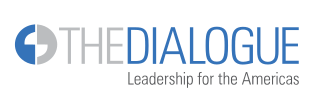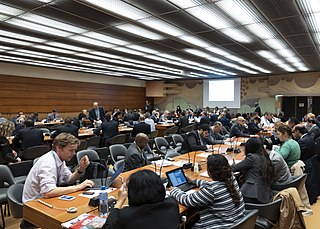A think tank, or policy institute, is a research institute that performs research and advocacy concerning topics such as social policy, political strategy, economics, military, technology, and culture. Most think tanks are non-governmental organizations, but some are semi-autonomous agencies within government or are associated with particular political parties or businesses. Think-tank funding often includes a combination of millionaire donations and individual contributions, with many also accepting government grants.

The World Economic Forum (WEF), based in Cologny, Geneva Canton, Switzerland, is an international NGO, founded on 24 January 1971 by Klaus Schwab. The foundation, which is mostly funded by its 1,000 member companies as well as public subsidies, views its own mission as "improving the state of the world by engaging business, political, academic, and other leaders of society to shape global, regional, and industry agendas".

The G20 is an intergovernmental forum comprising 19 countries and the European Union (EU). It works to address major issues related to the global economy, such as international financial stability, climate change mitigation, and sustainable development.
The Stockholm Network was a pan-European think tank and network located in London. In addition to its own policy research, it was an umbrella organisation for market-oriented think tanks in Europe. It had over 130 member organisations.

The Internet Governance Forum (IGF) is a multistakeholder governance group for policy dialogue on issues of Internet governance. It brings together all stakeholders in the Internet governance debate, whether they represent governments, the private sector or civil society, including the technical and academic community, on an equal basis and through an open and inclusive process. The establishment of the IGF was formally announced by the United Nations Secretary-General in July 2006. It was first convened in October–November 2006 and has held an annual meeting since then.

Mahmoud Mohieldin, is the World Bank Group's senior vice president for the 2030 Development Agenda, UN Relations, and Partnerships. He serves as a board member on the Global Partnership for Sustainable Development Data, as well as an observer to the EU Multi-Stakeholder Platform for the SDGs. Mohieldin previously served as corporate secretary, president's special envoy, and managing director for the World Bank Group.

The Inter-American Dialogue is a U.S.-based think tank in the field of international affairs primarily related to the Western Hemisphere. Headquartered in Washington, D.C it intends to "foster democratic governance, prosperity, and social equity in Latin America and the Caribbean". The Dialogue's research areas focus on the rule of law, education, migration, remittances, energy, climate change and extractive industries.
The Centre for Policy Dialogue (CPD), established in 1993 by Rehman Sobhan, its Founder chairman, with support from leading civil society institutions in Bangladesh, is mandated by its Deed of Trust to service the growing demand originating from the emerging civil society of Bangladesh for a more participatory and accountable development process. CPD seeks to address this felt-need from the perspectives of marginalised stakeholders, by way of organising multistakeholder consultations, by conducting research on issues of critical national, regional and global interests, through dissemination of knowledge and information on key developmental issues, and by influencing the concerned policy making processes.

The Institute of Development Studies (IDS) is a think tank affiliated with the University of Sussex and based on its campus in Falmer, East Sussex. It delivers research and teaching in the area of development studies, for which it has been ranked first in the world in the QS World University Rankings in 2020 jointly with its partner, the University of Sussex. IDS was also recognised as the number one international development think-tank in the 2019 Global Go To Think Tank Index Report.

The Global Labour University (GLU) is an international network of universities, trade unions, NGOs and the International Labour Organisation. It was initiated in 2002 and offers masters programs, academic certificate programs and Massive Open Online Courses (MOOC) on sustainable development, social justice, international labour standards and trade/labour unions, economic policies and global institutions.
The International Transport Forum (ITF) is an inter-governmental organisation within the OECD system. It is the only global body with a mandate for all modes of transport. It acts as a think tank for transport policy issues and organises the annual global summit of transport ministers. The ITF's motto is "Global dialogue for better transport". Between 1953–2007, the organisation had existed for over fifty years as the European Conference of Ministers of Transport.

Jean-Pierre Lehmann was a Swiss economist who was professor of international political economy at IMD and the founding director of The Evian Group at IMD. In August 2011, he was appointed senior fellow at the Fung Global Institute (FGI), a think-tank producing innovative thinking and research on global issues from Asian perspectives.
BEST Education Network (BEST-EN), headquartered at James Cook University, Australia is an international, inclusive and collaborative network, focusing on the creation and dissemination of knowledge to support education and practice in the field of sustainable tourism.

The Emerging Markets Forum (EMF) is an accredited non-profit, 501(c)(3) organization dedicated to developing dialogue on economic, financial, and social issues facing emerging market economies. EMF advocates for increased dialogue between government and corporate leaders through its global forum events. Its motto is "Bringing people together to accelerate growth and well-being in emerging markets."

The World Resources Forum (WRF) is a non-profit organisation for sharing knowledge about the economic, political, social and environmental implications of global resource use. WRF promotes resource productivity among researchers, policymakers, business, NGOs and the public. In addition to organizing international and regional conferences, the WRF Secretariat coordinates multistakeholder dialogue projects, amongst others the Sustainable Recycling Initiative (SRI) as well as the H2020 projects Towards a World Forum on Raw Materials (FORAM), and CEWASTE. The WRF contributes to other EC-projects and projects with the German development organisation GiZ, UNEP and UNIDO.
Multistakeholder governance is a practice of governance that employs bringing multiple stakeholders together to participate in dialogue, decision making, and implementation of responses to jointly perceived problems. The principle behind such a structure is that if enough input is provided by multiple types of actors involved in a question, the eventual consensual decision gains more legitimacy, and can be more effectively implemented than a traditional state-based response. While the evolution of multistakeholder governance is occurring principally at the international level, public-private partnerships (PPPs) are domestic analogues.

The Post-2015 Development Agenda was a process from 2012 to 2015 led by the United Nations to define the future global development framework that would succeed the Millennium Development Goals. The new framework, starting from 2016 is called Sustainable Development Goals.

The biennial World Investment Forum (WIF) is organized by the United Nations Conference on Trade and Development (UNCTAD) to promote investment for sustainable development and facilitate policy dialogue among a diverse community of investment stakeholders. The forum brings together policymakers, including Heads of State and Government, Ministers and other government officials responsible for investment; representatives from the private sector, including CEOs; international organisations working in the area of sustainable development and poverty reduction; thought leaders from academia and research institutions; and other members of the international investment community, including treaty negotiators, investment promotion and location experts, heads of sovereign wealth funds, heads of stock exchanges, and NGOs.

Alter-globalization is a social movement whose proponents support global cooperation and interaction, but oppose what they describe as the negative effects of economic globalization, considering it to often work to the detriment of, or to not adequately promote, human values such as environmental and climate protection, economic justice, labor protection, protection of indigenous cultures, peace and civil liberties.

Erik Berglöf is a Swedish economist, currently the Chief Economist of the Asian Infrastructure Investment Bank (AIIB), the Beijing-based multilateral development bank established in 2016 with a mission to improve social and economic outcomes in Asia. In March 2019 Erik Berglöf was appointed to the European Council's High Level Group of Wise Persons on the European financial architecture for development where Berglöf and eight other economists will suggest changes to the EU's development finance structure. In 2017–2018 Erik Berglöf served on the secretariat of the G20 Eminent Persons Group on Global Financial Governance and on the Governing Board of the Institute for New Economic Thinking in New York.













